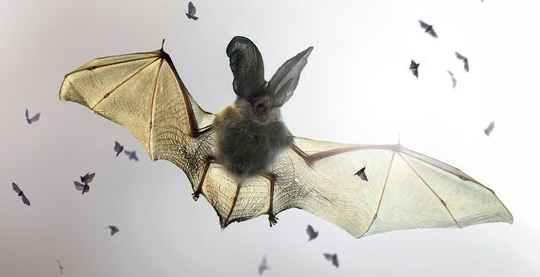
In the two months since Zika-infected mosquitoes were discovered in Miami Beach, the city has become ground zero for the disease in the U.S.
Dozens of people in Miami Beach have contracted Zika from the Aedes aegpyti mosquito since officials confirmed the first cases in the city in August. An unprecedented federal travel warning has rocked the local economy. Officials are scrambling for a solution.
Aerial spraying of the controversial pesticide naled has wiped out Zika zones elsewhere in Miami-Dade County, but it doesn’t appear to be working well in the 4.5-mile swath of Miami Beach where transmission has spiked.
The health crisis has led one local official to seek help elsewhere in the animal kingdom.
This week, Miami Beach Commissioner Kristen Rosen Gonzalez unveiled a proposal to attract large numbers of bats to the city in an attempt to reduce the local mosquito population. As reported by the Miami New Times, the measure calls for officials to install bat houses throughout Miami Beach in a pilot program that could be expanded later in the year.
The hope is that the winged allies will provide a safer and possibly more effective alternative to naled spraying, Rosen Gonzalez said in the resolution.
Naled “poses health and environmental risks,” Rosen Gonzalez said, whereas “bats can eat up to 1,000 mosquitoes per hour and offer an environmentally friendly approach to mosquito control.”
Using bats to reduce mosquito populations is certainly unconventional but not new, according to the American Mosquito Control Association, a nonprofit representing scientists and mosquito workers. In an FAQ on its website, the organization seems skeptical of the approach, noting that bats are “opportunistic” eaters that don’t necessarily “specialize” on mosquitoes.
“Large, concentrated populations of mosquitoes could provide adequate nutrition in the absence of alternative food,” AMCA says. “However, a moth provides much more nutritional value per capture than a mosquito.”
Still, the organization says, studies show that bats can consume 10 mosquitoes in a minute, meaning a colony of 500 bats could devour a quarter million of the insects in an hour.
“Impressive numbers indeed,” AMCA says, “but to utilize them as the sole measure of control would be folly indeed, particularly considering the capacity of both mosquitoes and bats to transmit diseases.”
In August, Florida officials confirmed that the Zika virus was being spread in Miami Beach by mosquitoes, prompting unprecedented travel advisories from the Centers for Disease Control and Prevention, which warned pregnant women not to travel to the area. Last month, officials expanded the transmission zone to a 4.5-mile area of the city, saying some three-dozen people had contracted the virus locally.
Other parts of the county had already seen outbreaks of the disease. Planes have sprayed Zika transmission zones in Florida with naled, a powerful insecticide that is prohibited in the E.U. but used in the U.S.
The spraying appears to have been effective in Miami’s Wynwood district, but spraying in Miami Beach drew criticism last month from Phillip Stoddard, a Florida International University biologist and mayor of South Miami, who said it had no significant impact on the local mosquito population. Demonstrators have taken to the streets on multiple occasions in recent weeks to protest naled spraying, warning that it can kill other wildlife and cause people to develop rashes and swollen eyes.
Miami Beach isn’t the first municipality to try to combat Zika with bats. In July, town officials in North Hempstead, N.Y., approved construction of bat houses in hopes of bringing more bats to the area.
“Bats can eat up to 1,000 mosquitoes per hour,” Judi Bosworth, the town supervisor, told the New York Times. “That’s extraordinary. A pesticide couldn’t do that.”
(c) 2016, The Washington Post · Derek Hawkins


